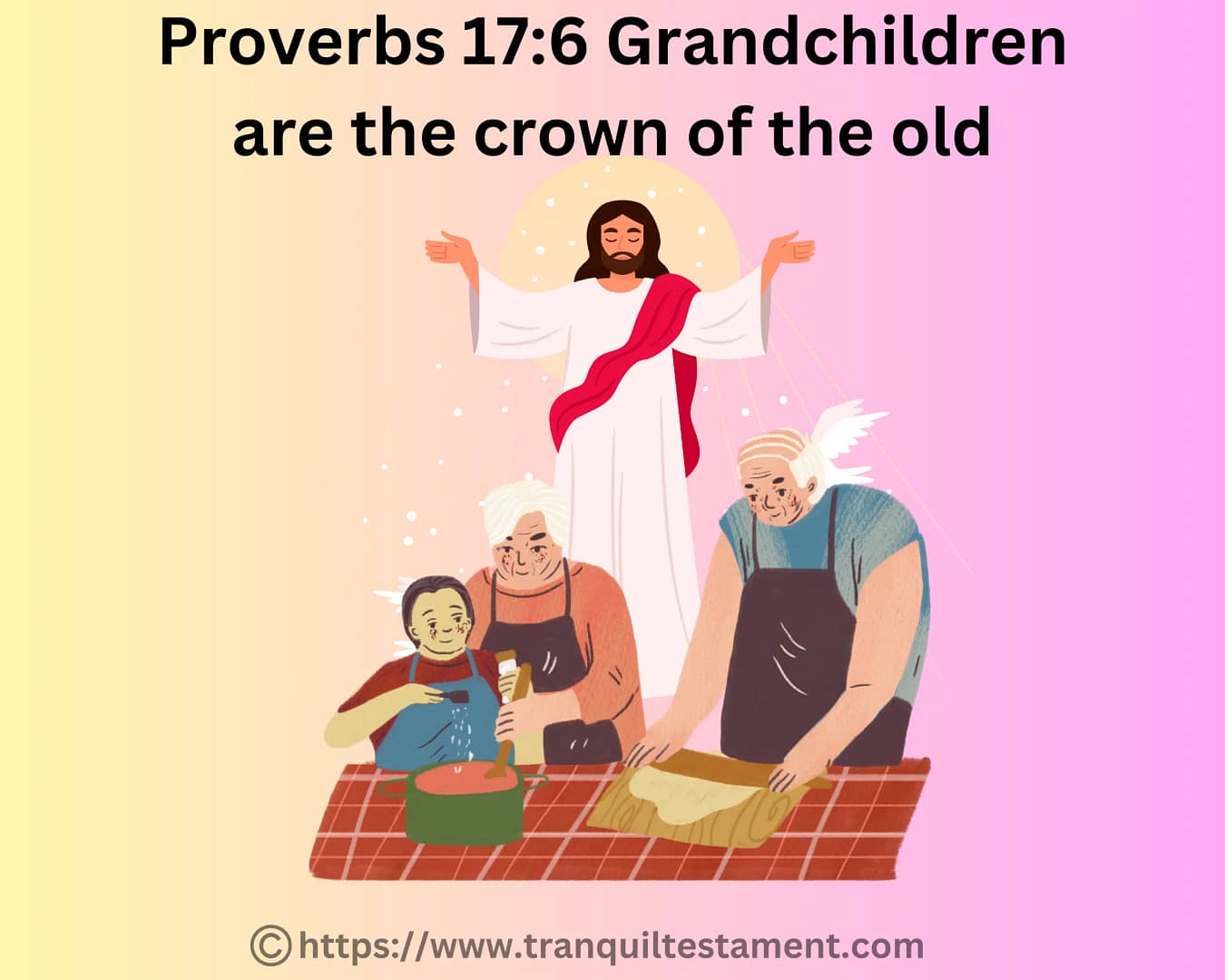Proverbs 17:6 Grandchildren are the crown of the old.
Verse 1 states,
“Better is a dry morsel and quietness with it than a house full of feasting with strife.”
Questionnaires for employment or opening an account may state, “List your hometown.” Thinking about a place may evoke positive or negative thoughts. Even more personal are thoughts about growing up in a family.
What was the experience like? Was it good, comforting and nurturing with a sense of peace and love? Or was it a place of stress, fear, anxiety, angry words and tears?
Why are there such different experiences? The answer can be found in the inspired Word of God. Paul stressed that becoming a Christian meant that there had to be a change in a person’s life at every level.
Becoming a Christian is not like joining a club. It involves a commitment to the Living God, and that person will be held accountable for the type of life that he/she lives.
This expectation comes back to the family. Paul wrote in Colossians 3:8-11,
“But now you yourselves are to put off all these: anger, wrath, malice, blasphemy, filthy language out of your mouth. Do not lie to one another, since you have put off the old man with his deeds, and have put on the new man who is renewed in knowledge according to the image of Him who created him, where there is neither Greek nor Jew, circumcised nor uncircumcised, barbarian, Scythian, slave nor free, but Christ is all and in all.”
Proverbs 17:6 Grandchildren are the crown of the old
Paul also wrote in Galatians 5:22-25,
“But the fruit of the Spirit is love, joy, peace, longsuffering, kindness, goodness, faithfulness, gentleness, self-control. Against such there is no law. And those who are Christ’s have crucified the flesh with its passions and desires. If we live in the Spirit, let us also walk in the Spirit.”
If a marriage, and subsequent members of the family, live lives that are Christ-directed, the spiritual quality of their lives will be so much better.
But a family that is not directed by the teaching of the Bible will experience more grief. The members may have good intentions and have a love for one another, but the principles of the world are still dominant.
In both cases, families will face trials, unexpected problems, and even tragedy. But the loving bond that protects a Christ-directed family allows them to overcome, because they focus their trust on God.
Verse 5 states,
“He who mocks the poor taunts his Maker; He who rejoices at calamity will not go unpunished.”
People that mock people that are poor are showing an attitude of arrogance.
In Isaiah 13:11, the Prophet wrote,
"I will halt the arrogance of the proud, and will lay low the haughtiness of the terrible.”
No one has earned the right to boast concerning their position, their wealth, or social power. Any of these can be gone in an instant.
Some that appear to be poor materially may actually be rich spiritually. Remember the account of the Rich Man and the beggar Lazarus. When both die, Lazarus is carried to Abraham’s bosom; but the Rich Man is in torment.
Neither wealth or poverty automatically impute righteousness on a person. It is only when a person submits to the Will of God and lives a life of service to Him.
The second part of verse 5 carries a warning even for Christians, “He who rejoices at calamity will not go unpunished.” There may be times when men or women of power and influence cause great suffering.
It may also occur when a local bully or criminal targets a Christian family or business. Then that person is brought down by law enforcement or some other means. The threat and danger are removed!
The normal, and proper, response is to give thanks to God. But there may also be the temptation to indulge in a delight over what has happened to the former tormentors. Clearly, such attitudes must be restrained. God will judge but, God does not want any to perish.
Paul (as Saul of Tarsus) had been guilty of persecuting the Church, imprisoning Christians, and even having them put to death. Yet look at what Paul was able to accomplish in serving the Lord!
Rejoice that the source of the misery is over? Yes! Rejoice over the calamity that another is experiencing? No!
Proverbs 17:6 Grandchildren are the crown of the old

Verse 6 states,
“Grandchildren are the crown of old, And the glory of sons is their fathers.”
A comment that has been heard between Grandparents is, “If I had known that grandchildren were so wonderful, we would have had them first!” Grandchildren are very precious to both grandparents.
When a person dies, whatever money, influence, or power that person had is gone. But there is one thing that will remain, and that is the values and beliefs that have been instilled in that person’s children and grandchildren.
Of course, the history of Israel in the Old Testament is a picture of failure in this regard. One generation may appear to be devout, but then those beliefs were never passed on to the next generations.
Yet, strong godly parents can pass their love and commitment to the Lord on down to generation after generation. The reality of this can be seen in families where each generation was faithful, served the Lord, and lived good lives.
What greater gift can a grandfather take to the grave than the knowledge that his children and grandchildren shared his love for God.
The second part of that verse states, “….the glory of sons is their fathers.” How many fathers have told stories about their fathers to their own children or grandchildren. Good men that have been good fathers and raised their sons with love for the Lord are viewed with deep love and respect.
One man, 99 years old, was an evangelist for over 60 years. He and his wife raised four wonderful children: one Christian daughter that died from an illness, and three fine Christian men. He is viewed with deep respect by many, many Christians. This is the type of person that is seen in verse 6.
It is so sad when parents live lives in the world. Their homes have discord. The parents may divorce and remarry, and the children suffer from the breakup. The children have not moral or spiritual compass, and the relationship between parent and children may be filled with tension, arguments, and bitterness. The spiritual quality of life could be so much better, if only…..
What does a person do if someone else says or does something harmful to him? Possibly, the person was a friend, it may have been a co-worker, a neighbor, or simply a slight acquaintance. When that happens, what should be that person’s response?
This is the point that is being made in verse 9.
“He who conceals a transgression seeks love, But he who repeats a matter separates intimate friends.”
Today, so many react with anger and even violence at real, or perceived, wrongs. Sometimes, the slightest action or word can lead to angry actions and words. Sometimes, these arguments escalate, and someone can be hurt or even killed over something so insignificant.
So, what does a person do in that situation? One option is to simply let it go. If no one else needs to know then do not mention it. Of course, the one exception is God the Father. As God’s children, Christians can, and are expected, to bring everything before God in prayer.
He knows what happened, He knows what could have happened, and He will bring peace to the person that was wronged. That is what a person does if his/her focus is on loving and serving God. All one must do is look to the example of Jesus.
Not only that, but no one knows the trials that other people are facing. The words or actions may have been unintentional. There may be issues that cause that person to strike out at others. How many times has a person been thankful that he did not react in anger?!
But if a person turns to the ways of the world, the angry response could easily destroy a friendship. The worldly person will frequently revisit past insults and hurtful events. He will go over them again and again until others will tire of listening and drift away. When that happens, healing never really occurs, and the emotional wounds just fester and grow worse.
Finally, verse 15 states,
“He who justifies the wicked and he who condemns the righteous, Both of them alike are an abomination to the Lord.”
Today, it is common for political leaders and news media to take the details of an events and “spin” it in such a way to either support them or make the other person or organization look bad or incompetent. It happens so often, that people assume that there is a bias behind what is being said.
These practices are not new and are commonly used by people of the world without any real concern for the truth. Pilate asked Jesus, “What is truth?” Paul was hampered in his work by those following along spreading false accusations against him.
When Rome began to seriously persecute Christians, the rumor was spread that they were cannibals because they ate flesh and drank blood. This was an obvious distortion of the Lord’s Supper.
But the point in this verse is that God views any deliberate distortion of the truth as an abomination! People are human, and what is heard or witnessed is filtered through people’s own background, perceptions, and ability to clearly see or hear. Often, things are not seen or heard accurately.
One man wrote that the most unreliable evidence in an accident investigation is an eye witness account. This is why any misunderstanding or accusation was to be substantiated by two or three witnesses, and even then, investigated carefully.
But the actions in verse 15 are different. A person that justifies the wicked and condemns the righteous is doing this out of a deliberate decision to distort or attack the truth. There can be times when it would be tempting to slant a statement just a little bit to support a position or person.
Once again, the inspired Word of God makes it very clear that these actions are an abomination and there will be serious, even eternal, consequences!








[…] Paul made it clear that families were expected to care for the widows within their own families. Older widows that demonstrated a godly life style would be helped by the church, because they had no one […]